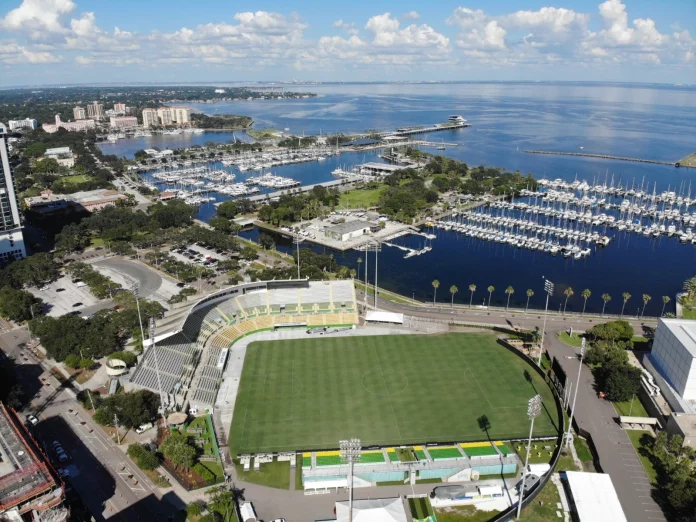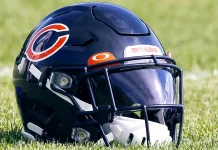Hurricane Milton wreaked havoc on the Tampa Bay area, causing hundreds of millions of dollars in damage. Among the structures impacted was Tropicana Field, home of the Tampa Bay Rays, where the roof was so severely destroyed that it is currently uncertain when, or even if, it can be repaired. Major League Baseball, along with the Rays, the City of St. Petersburg, and Pinellas County, are eager for the Rays to remain in the area to play some regular season games, or in the worst-case scenario, the entire 2025 season.
The premier choice in Pinellas County is Al Lang Field in downtown St. Petersburg, situated on the picturesque bay with access to numerous restaurants and cafes, making it ideal for fans. It was also once the preferred site to replace Tropicana Field. Al Lang Field currently hosts the Tampa Bay Rowdies soccer team. Conveniently, the Rays’ owners also own the Rowdies, which would simplify schedule coordination. Although Al Lang Field sustained hurricane damage and requires repairs, these could encompass the essential upgrades mandated by MLB and the Players Association. To accommodate the Rays, seating capacity would need to increase from 7,500 to approximately 12,000 or more if possible.
Commissioner Rob Manfred, speaking to the media in Los Angeles prior to Game Two of the World Series, highlighted the league’s aim to finalize the Rays’ temporary home by Christmas to facilitate the arrangement of details. Any chosen location for the Rays will need a new surface to comply with major league standards and enhanced lighting to accommodate network television requirements.
“They’re still in the damage-assessment mode,” Manfred said. “They’re trying to figure out how bad the damage is that needs to get done, and obviously, it was not just the roof.”
Manfred has suggested multiple alternatives given the improbability of Tropicana Field in St. Petersburg, Florida, being prepared for Opening Day. The options include utilizing a minor league or spring training facility, with MLB insiders naming Tampa, Dunedin, and Clearwater as the preferred locations for games in the region.
The Major League Baseball Players Association has a say in the new temporary home of the Rays and it was addressed last week. “It starts with the playing surface and the safety of the ballpark itself,” MLB Players Association executive director Tony Clark said Friday before Game 1 of the Series. “Ensuring that you can get the work done that you need to get done and that the surface is reflective, and the ballpark is reflective, of major league standards.”
Al Lang is arguably the most logical site due to its location, as it would not conflict with minor league schedules and would greatly benefit the downtown business community. Although the Rowdies would need to coordinate their schedule, they typically play twice a week and could arrange their games for when the Rays are away.
Additionally, if the damage to Tropicana Field is so severe that repair costs are prohibitively high, it may justify getting an early construction on the new stadium. It would be silly to invest further in a facility beyond repair. Meanwhile, a renovated Al Lang Stadium, set against the picturesque downtown bayfront, would present an appealing image on national television and serve as a postcard to attract more visitors to the city.
We already have a model for the Al Lang renovation as MLB has sanctioned the Las Vegas Athletics to play all their games at a minor league park in Sacramento, California, for the next three years while their new stadium is constructed in Las Vegas. Presently, MLB is collaborating with the team and the city to install a new grass surface to ensure safer conditions due to the summer heat. Additionally, temporary stands will be added to increase seating capacity from approximately 11,000 to 15,000 fans, along with new lighting to comply with network broadcast standards.
True baseball fans can endure the heat and rain—it’s just part of summer in Florida. From 1993 to 2011, the Miami Marlins played at the Dolphins stadium, known for its heat and frequent Miami rains. Meanwhile, the Atlanta Braves host games in their relatively new open-air ballpark, where average summer temperatures hover in the low to mid-80s, accompanied by notable humidity, yet they still attract large crowds.
So, deal with it and just have fun watch the Rays!
Rant Sports Ranked the possible options for the Rays temporary home
Lawmakers in Pinellas County view TD Ballpark in Dunedin an option for the Rays. The park having played a significant role for the Blue Jays during COVID in2020, serving as their spring training ground before becoming their regular-season home for May and June, until they relocated to Buffalo to be nearer to their fan base. With a seating capacity of only 8,500 it’s a fantastic venue to enjoy a game, this could be a nice landing spot the Rays. Therefore, I would rate it a B- because it is about 25 miles from Tampa and might be a challenge to get to for fans.
Another location in Pinellas County is BayCare Ballpark, the winter home of the Phillies. Similar to its counterpart in North Pinellas County, BayCare Ballpark accommodates around 8,500 fans, offers excellent seating and sightlines, and is the nearest ballpark to Tropicana Field. However, the traffic on U.S. 19 is notoriously challenging, which can detract from the ballpark’s appeal and make driving problematic, leading to a grade of C.
The premier choice in Pinellas County is Al Lang Field in downtown St. Petersburg, situated on the picturesque bay with access to numerous restaurants and cafes, making it ideal for fans. It was also once the preferred site to replace Tropicana Field. Al Lang Field currently hosts the Tampa Bay Rowdies soccer team. Conveniently, the Rays’ owners also own the Rowdies, which would simplify schedule coordination. Although Al Lang Field sustained hurricane damage and requires repairs, these could encompass the essential upgrades mandated by MLB and the Players Association. To accommodate the Rays, seating capacity would need to increase from 7,500 to approximately 12,000 or more, which would merit an A grade.
The family’s favorite is George M. Steinbrenner Field in Tampa, the winter home of the New York Yankees. With its capacity of over 10,000 seats and proximity to Raymond James Stadium, it stands out as a top choice. Among all the spring training facilities available to the Rays, Steinbrenner Field is the largest and most equipped for Major League Baseball, meriting an A+ grade.
Regardless of the ballpark the Rays choose, unless it’s Al Lang or their Port Charlotte winter home, they will require MLB’s assistance to coordinate with the Blue Jays, Phillies, or Yankees to facilitate any regular season home games, even for a brief period. While it’s conceivable that the Rays might relocate within the Bay Area or possibly to Orlando, moving out of state is not an option as it would invalidate their TV contract with Bally’s Sports.







